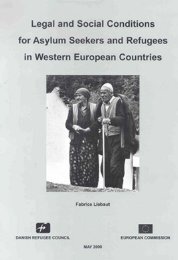Bulgaria - The social impact of seasonal migration
Bulgaria - The social impact of seasonal migration
Bulgaria - The social impact of seasonal migration
You also want an ePaper? Increase the reach of your titles
YUMPU automatically turns print PDFs into web optimized ePapers that Google loves.
82<br />
agencies, newspaper articles and interviews – show a significantly larger number <strong>of</strong><br />
emigrants.<br />
It is difficult to make precise conclusions about the possible scope <strong>of</strong> e<strong>migration</strong> almost<br />
entirely on the basis <strong>of</strong> research <strong>of</strong> potential migrants. Yet one is able to detect a clear<br />
tendency showing that temporary <strong>seasonal</strong> <strong>migration</strong> dominates over the permanent one.<br />
<strong>The</strong> preferred destinations are Greece, Spain, Italy, Germany, and <strong>The</strong> Netherlands and<br />
the main motive is related to finding a job, or one that is better paid. <strong>The</strong> <strong>Bulgaria</strong>n<br />
<strong>seasonal</strong> emigrants work mostly in agriculture, construction building, domestic care,<br />
housekeeping, hotels and restaurants, and the textile industry. <strong>The</strong> pr<strong>of</strong>ile <strong>of</strong> migrants<br />
as well the destination <strong>of</strong> <strong>migration</strong> is geographically determined and depends on<br />
already created networks. So in some <strong>Bulgaria</strong>n municipalities female e<strong>migration</strong><br />
prevails, while in others migrants are predominantly male. Migration is also ethnically<br />
specific, meaning that in some municipalities the emigrants come entirely from the<br />
Turkish ethnic group in <strong>Bulgaria</strong>, whereas in others they are ethnic <strong>Bulgaria</strong>ns. In still<br />
other municipalities, Roma e<strong>migration</strong> prevails. <strong>The</strong> fact that <strong>migration</strong> from <strong>Bulgaria</strong> has<br />
a regionally as well as ethnically specific pr<strong>of</strong>ile suggests that regulating and managing<br />
<strong>migration</strong> would require regionally and ethnically differentiated policy measures.<br />
<strong>The</strong> prognostic evaluation <strong>of</strong> expected actual e<strong>migration</strong>, done by the experts <strong>of</strong> the<br />
National Statistical Institute on the basis <strong>of</strong> preliminary data from the 2001 census,<br />
shows that in the next five years there is no danger <strong>of</strong> an e<strong>migration</strong> wave from <strong>Bulgaria</strong><br />
which would destabilise the labour markets in the EU member-states.<br />
<strong>The</strong> number and pr<strong>of</strong>ile <strong>of</strong> immigrants to <strong>Bulgaria</strong> are better known to the <strong>of</strong>ficial<br />
authorities than the communities <strong>of</strong> <strong>Bulgaria</strong>n emigrants abroad. Concerning<br />
im<strong>migration</strong>, <strong>Bulgaria</strong> remains primarily a transit country despite the visible signs <strong>of</strong> its<br />
greater attractiveness as a final destination country manifested in the last years, and<br />
especially after the start <strong>of</strong> the EU accession negotiations in 1999. <strong>The</strong> National Police<br />
data clearly show that there is a tendency <strong>of</strong> increasing the number <strong>of</strong> foreign citizens<br />
staying legally in <strong>Bulgaria</strong> with permanent and long-term residence permits.<br />
Structurally, there are no major changes in the countries <strong>of</strong> origin <strong>of</strong> the permanent and<br />
long-term residents in <strong>Bulgaria</strong> in the last couple <strong>of</strong> years. One <strong>of</strong> the most significant<br />
tendencies is the decreasing number <strong>of</strong> citizens from CIS countries and the increasing<br />
number <strong>of</strong> Russian citizens, although the total number <strong>of</strong> CIS and Russian citizens<br />
remains stable.<br />
<strong>The</strong> traffic <strong>of</strong> foreigners to and through <strong>Bulgaria</strong> becomes more complex and better<br />
organised. Changes in legislation in 2001-2, improvement <strong>of</strong> the administrative capacity<br />
<strong>of</strong> the specialised border police institutions and the tightened and more effective<br />
control on the <strong>Bulgaria</strong>n borders led to restructuring <strong>of</strong> the channels for illegal<br />
im<strong>migration</strong> to the EU countries. <strong>The</strong> chief <strong>migration</strong> flows are from Asia and Africa,<br />
namely from Afghanistan, Iraq, Iran, Turkey, Nigeria, Sudan, Ethiopia and Algeria.<br />
Lifting visa restrictions for short-term entry <strong>of</strong> <strong>Bulgaria</strong>n citizens in the Schengen space<br />
in April 2001 resulted in more than 4-fold decrease in the number <strong>of</strong> border-regime<br />
violations committed by <strong>Bulgaria</strong>n citizens.

















